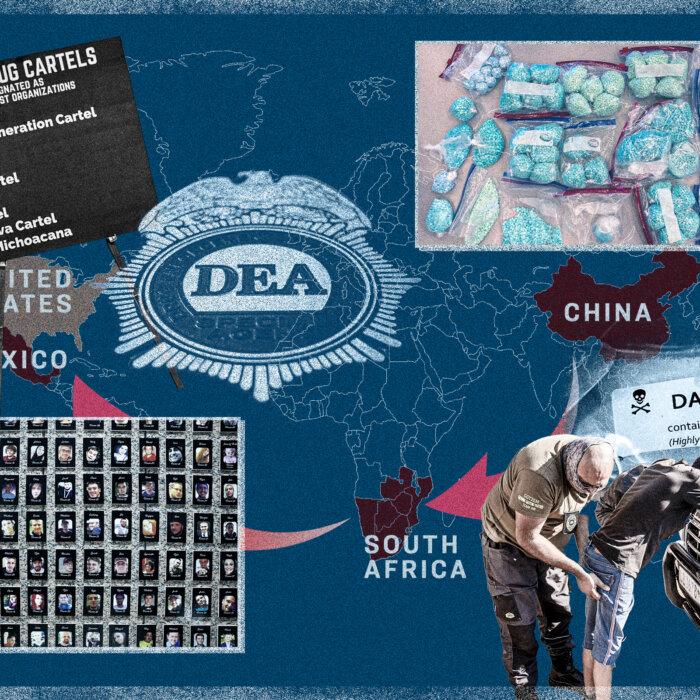Analysts Weigh In: Africa at a Crossroads Following $13 Billion Cut in US Aid
JOHANNESBURG—The recent announcement by the U.S. government regarding a $13 billion reduction in financial aid stunned numerous African nations.
Analysts suggest that this move might encourage improved governance in these countries, while even critics contend that it reveals the most corrupt regimes worldwide.
In the fiscal year 2024, the U.S. allocated nearly $13 billion in taxpayer funding to assist various nations across Africa, a region ranked as the most corrupt globally by the watchdog Transparency International.
The majority of these funds were managed by the U.S. Agency for International Development (USAID), which has now suspended many of its initiatives and merged its operations with the State Department.
This funding primarily supported efforts to provide food for those in famine-stricken areas and to combat infectious diseases, including HIV, malaria, and tuberculosis.
The United Nations has warned that millions of lives could be endangered due to the cessation of U.S. support.
Nearly 16 million people in Ethiopia depended on U.S. grain contributions in 2024, amidst the challenges posed by severe drought and ongoing civil conflict.
In South Africa, USAID funds were being used to pay staff salaries in hundreds of nonprofits involved in the world’s largest antiretroviral therapy program, which provides medication to nearly 6 million people living with HIV.
“Currently, the program operates at less than half its potential capacity,” stated Foster Mohale, spokesperson for South Africa’s National Department of Health, in an interview with The Epoch Times. “Millions of individuals are missing out on crucial medications due to the closure of partner organizations.”
Similar narratives are emerging across the African continent.
Chris Maroleng from the nonprofit Good Governance Africa told The Epoch Times that Donald Trump’s funding suspension brings into sharp relief the rampant corruption in many African governments.
“We must urge our leaders to adopt transparent governance and to distribute the continent’s resources fairly—not by merely handing out cash, but by ensuring essential services are provided,” he asserted. “That’s a reasonable expectation.”
Maroleng recognized Trump’s authority to halt aid to Africa but noted that many leaders in business, politics, and civil society expressed their disappointment and frustration at the abruptness of this decision.
“It doesn’t give them sufficient time to adjust their budgets or seek alternative assistance,” he remarked.

Women carry boxes of porridge donated by the World Food Programme in collaboration with USAID during a drought in Mutoko, Zimbabwe, on March 13, 2019. Jekesai Njikizana/AFP via Getty Images
“The abrupt and harsh withdrawal of U.S. aid is detrimental because it leaves the most vulnerable populations even more susceptible to hunger, illness, and social challenges,” Cilliers expressed to The Epoch Times.
He suggested a gradual phasing out of aid over five years to mitigate the impact and allow policymakers the necessary time to adjust and find alternative funding.
Conversely, Nigerian economist Nengak Gondyi remarked, “It’s time for Africa to take responsibility for its own affairs.”
He asserted that the continent must stop wallowing in self-pity and anger towards the Trump administration.
“What Africa needs most isn’t simply large monetary contributions, but an honest evaluation of how resources are allocated and utilized,” Gondyi articulated to The Epoch Times.
“Improving government revenue collection, eradicating corruption and financial crimes endemic to Africa, along with broadening tax bases, are essential actions that should take precedence now.”
Transparency International’s annual Corruption Perceptions Index analyzes and evaluates corruption in 180 countries.
It categorizes 90 percent of Africa’s 54 nations as “highly corrupt.”
In 2023, all but one—Eritrea—received U.S. financial assistance.

A vendor awaits customers at her fruit and vegetable stall in Waheen Market, Hargeisa, Somalia, on Nov. 8, 2024. Luis Tato/AFP via Getty Images
“Corruption is deeply entrenched at all government levels and affects nearly every economic sector, with perpetrators operating with wide-ranging impunity,” notes the organization’s website.
“This situation significantly impacts the populace by diverting wealth from the country’s ample oil reserves into personal accounts rather than facilitating public service delivery or essential capital investments.”
The Horn of Africa has long been troubled by ethnic conflicts and an insurrection led by the al-Shabaab terrorist group, affiliated with al-Qaeda.
“Corruption is a key factor contributing to and perpetuating the political instability in Somalia,” Transparency International stated on its website.
“Corruption manifests at both public and private sector levels and is a prevalent and expected behavior across society.
“It influences virtually every aspect of Somali life, leading to officials misusing public resources for personal gain and soliciting bribery for essential services, as well as fostering clan-based patronage networks that facilitate employment and political appointments.
“Businesses also adapt to the prevailing lawless conditions, for instance, by evading taxes and selling expired goods.”
David Ansara, an economist at the Free Market Foundation in South Africa, shared with The Epoch Times, “What we are witnessing is an ongoing cycle where the U.S. funnels billions of dollars into African nations that are often among the wealthiest in terms of resources, but their leaders are misappropriating profits instead of caring for their citizens.”
Ansara acknowledged that USAID was effectively managing funds in Africa, stating that the program had robust controls in place, but emphasized, “The core issue is that African governments must prioritize their responsibility towards their people, particularly those that manage substantial natural resource wealth.”
He highlighted the Democratic Republic of the Congo and Nigeria as notable examples.
“Why should the U.S. continue to provide financial support to these nations?” he questioned. “There is no justification for their citizens to endure poverty under such circumstances.

Residents traverse the main road of the Rubaya mines in the Democratic Republic of Congo (DRC) on March 5, 2025. This region, subjected to 30 years of conflict, holds an estimated 60 to 80 percent of the world’s coltan reserves, a critical mineral used in electronic device manufacturing.Camille Laffont/AFP via Getty Images
“In theory, these nations are exceedingly wealthy. In reality, however, it’s primarily the political elite that benefit, as income is either embezzled and hidden in offshore accounts or mismanaged.”
“Historically, the Democratic Republic of Congo has faced violence and significant power abuses,” Transparency International remarks on its website.
“Ongoing civil wars combined with chronic mismanagement of state resources have relegated the DRC to a position among the world’s fragile states, known for their poor infrastructure.
“Bribery, lack of political integrity, and ineffective oversight institutions exacerbate clientelism, rent-seeking, and instability throughout the nation.”
This West African nation, which is the second-largest economy in Africa, generates most of its income from oil and gas as well as minerals, including coal, tin, iron ore, limestone, and precious stones.
In 2024, Nigeria’s crude oil revenue was approximately 51 trillion naira (around $33 billion), as reported by the Nigerian Upstream Petroleum Regulatory Commission.
“In Nigeria, widespread corruption is prevalent in politics and public administration, where patronage networks hold significant sway,” Transparency International notes on its website.
“This situation manifests at the federal, state, and local government levels as well as in the judiciary, electricity sector, and extractive industries.
“Oil revenue has disproportionately benefited the ruling elite through systemic corruption, embezzlement, and capital flight.”

Employees stand near a section of Dangote Petroleum Refinery in Lagos, Nigeria, on May 22, 2023. Pius Utomi Ekpei/AFP via Getty Images
Given this backdrop, Ansara remarked that he was not shocked by Trump’s decision to halt aid.
“Upon evaluating the current circumstances, this isn’t an extreme measure,” he stated. “Why continue to send over a billion dollars to a country that generates billions in oil revenue each year?
“Certainly Nigeria should be capable of supporting its own population and providing essential healthcare services? What has transpired is that corrupt leaders have exploited aid to evade their duties while further enriching themselves, and Trump has acknowledged this.”
Transparency International has reported that Mozambique’s vast oil and gas resources have been “captured” by an elite circle associated with former President Felipe Nyusi, leaving charity organizations responsible for ensuring citizens’ basic needs.
“Mnangagwa allows smugglers to operate in Zimbabwe and directed governmental employees to facilitate the sale of gold and diamonds in illicit markets, receiving bribes for these actions,” the Treasury detailed. “Mnangagwa oversees the nation’s security forces, which have violently suppressed political opposition and civil society movements.”

Zimbabwean President Emmerson Mnangagwa arriving for the inauguration of South African President Cyril Ramaphosa in Pretoria, South Africa, on June 19, 2024. Instead of elevating Zimbabweans from poverty, Mnangagwa’s regime profits while collaborating with mining companies linked to China, according to Transparency International. Phill Magakoe/POOL/AFP via Getty Images
Instead of alleviating the struggles of its citizens, Mnangagwa’s government benefits financially and shares gains with mining firms tied to Beijing, Transparency International reported.
“Illicit financial flows (IFF) have drained billions from Zimbabwe’s economy, particularly in sectors like mining, forestry, and wildlife,” the watchdog indicated. “A significant portion of these illicit proceeds is related to corruption.”
Gondyi added that Africa can no longer depend on international aid.
“With the vast resources available in Africa and the influx of funds through foreign investment and remittances, we must become self-sufficient,” he asserted.
“The challenge lies in managing resources effectively and fostering investments that address societal issues rather than merely boosting profits.”
According to Gondyi, harnessing African philanthropy could provide the necessary funding for crucial projects that were once managed by USAID.
This could be achieved through individual and corporate contributions, organized crowdfunding efforts, and investments in social impact projects and bonds.
“It’s essential that these projects are thoroughly monitored by trusted experts with no government ties,” Gondyi emphasized.

Idle excavators at the Arcadia Lithium mining site in Goromonzi, Zimbabwe, on Jan. 11, 2022. The Zhejiang Huayou Cobalt firm acquired this lithium mine in February 2022, which produces a key ingredient for electric vehicle batteries. Tafadzwa Ufumeli/Getty Images
Cilliers emphasized that Africa’s private sector must intensify its contributions to relevant causes and that other nations should assist in filling this funding gap.
“China has expressed a desire to transition from merely extracting resources in Africa to becoming a more viable donor country,” he stated.
Last year, Beijing pledged to augment its aid to Africa, committing to $51 billion over the upcoming three years.
“China should expedite these initiatives and enhance grant funding for Africa rather than only offering loans,” Cilliers urged.
“Additionally, nations like the United Arab Emirates and Saudi Arabia, which are emerging as significant aid donors to other low-income countries, should also enhance their support for Africa.”
Ultimately, Maroleng commented that the continent should leverage the shock from the abrupt loss of U.S. aid to strive toward greater self-sufficiency.








